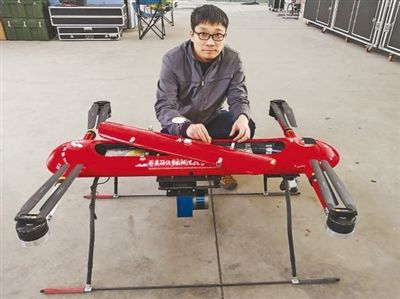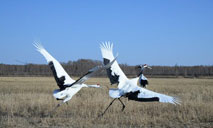Young scientist defies tough natural conditions, devotes himself to robotics research
Undaunted by harsh working conditions, a young Chinese scientist endeavors to break through technological bottlenecks and apply his research achievements on robotics to a broad array of key fields, such as scientific exploration and public security.

Photo shows He Yuqing and a UAV made by him. (People's Daily/Liu Hongchao)
He Yuqing's strong interest in scientific research dates back to the early days of his university life when he was fascinated by a book entitled Introduction to Robotics that he accidently laid eyes upon in the school library. "Although published as early as 1994, the book was full of state-of-the-art knowledge, which inspired me a lot," He explained.
After obtaining his bachelor's degree from Northeastern University in Shenyang, capital of northeast China's Liaoning province in 2002, He started to work as a researcher in the field of control theory for robotics at the Shenyang Institute of Automation, associated with the Chinese Academy of Sciences.
"The early stage of my working experience benefited me a lot," the man revealed. In fact, after his admission to the institute, He felt frustrated and discouraged by a series of failures he encountered while working on control algorithms for robots. Luckily, the support of his supervisors and colleagues as well as his sense of mission in conducting scientific research carried him through that initial rough patch.
He's self-confidence was also boosted by his participation in the research and development for China's first robot created for science investigation purposes in the Antarctic. "Persistence is a good remedy," the man noted.
In July 2020, He and a team of students started to conduct UAV flight tests on the Qinghai-Tibet Plateau, which is best known for its high altitude, harsh terrain conditions and awful weather. "Many of my students got cold feet as they had never been in such a terrible environment," recalled the man.
Instead of criticizing and blaming his younger teammates, He reassured them by going to great lengths to invite several staff members at a similar age from a Qinghai-Tibet scientific research team to introduce their own work and life stories.
After more than two months of efforts, He led the team to break through a number of technical bottlenecks and complete UAV test flights in extreme environments with variable air conditions and strong winds.
"Next, we will continue to improve the ability of robots to resist extreme environments and continue to promote the application of robots in a wider range of high-altitude scientific research tasks," said the young researcher, believing that robots will be widely adopted for scientific exploration, disaster relief as well as other scenarios in the near future.
Photos
Related Stories
- Maiden test flight proves successful for new drone
- China's industrial robot production surges in October
- Alibaba deploys autonomous logistics robots for ‘Double 11’ package delivery
- RoboMaster 2020 Youth Tournament kicks off in Macao
- Chinese firefighters build "fire-fighting robot" with scrap parts
- China's industrial robot output surges 29.2 pct in June
- China-developed Wing Loong UAV capable of serving emergency communication
- Chinese-led scientists create tiny, bio-inspired robot
- Robots on duty in anti-epidemic battle in eastern Chinese city
- Robots deployed to help fight coronavirus
Copyright © 2021 People's Daily Online. All Rights Reserved.










